With slightly more than one year until the United States presidential election, electoral campaigns are about to ramp up. These quadrennial elections, like so many others in democracies worldwide, will mobilize thousands of campaign workers who play an integral role in shaping candidates’ electoral performance. Yet, little is known about these workers and how the experience of working in a campaign shapes their professional lives. This column describes the findings from a new study on the career trajectories of campaign labor in Brazil, showing that connections forged on a campaign provide qualified workers with better employment and earnings opportunities. This article was originally published in VoxEU.
Presidential campaigns are in full swing across the United States. According to George Gao, approximately 15 to 20,000 workers are employed by political organizations during election years in the United States. Several scholars have shown how the success of political candidates crucially depends on the labor of these many campaign workers. Despite their importance to the electoral process, little is known about campaign workers and their careers.
Anecdotally, they work long hours for little pay and lack access to many of the benefits of more stable forms of employment (see, e.g., Campaign Workers Guild website). This leaves open the question as to what motivates campaign workers to perform such an important job for democracies around the world. While many of these workers may be motivated by public interests, working in a campaign may also provide opportunities to develop connections that can have long lasting effects on a worker’s career. However, the extent to which campaign workers benefit from such connections is unknown. In most countries, in fact, it is not possible to link information on the career trajectories of campaign workers to the success of the political candidate for whom they work.
In a new study, we overcome these data constraints to provide fresh evidence on the returns to campaign labor. We connect several administrative data sources from Brazil that allow for tracking of approximately 380,000 workers before, during, and after their time employed by mayoral campaigns across several thousand municipalities. Using this new dataset, we find that campaign workers tend to be young, females and to have low earnings and little experience in the formal labour market prior to the elections. We then link information on these workers’ employment and earnings to the success of the mayoral candidate for whom they worked.
In order to isolate the effect of campaign connections on subsequent career trajectories, we compare changes in earnings, hours worked and hourly wages before versus after the campaign for workers of winning versus losing campaigns in the same municipal election. In this analysis, we focus on elections that are decided by a close margin to address the potential concern that workers of winning campaigns may systematically differ from workers of losing campaigns. To the extent that the outcome of close elections is difficult to predict, in fact, we would expect to find little difference between workers of campaigns that barely win versus those who barely lose the election. Consistent with this hypothesis, we do not observe statistically significant differences between observable demographic or socioeconomic characteristics of workers from barely winning versus barely losing campaigns.
Our analysis uncovers large labor market returns for workers of a victorious campaign. Figure 1 provides graphical evidence of this result. The figure plots the difference in hours worked (Panel (a)), hourly wages (Panel (b)) and earnings (Panel (c)) between workers of barely winning versus barely losing campaigns in the 4 years around the election. The figure shows a large increase in labor market returns after the election (time 0 in the figure) for workers on campaigns that barely won close elections relative to those working for campaigns that barely lost. These returns materialize quickly through a combination of more hours worked and higher hourly wages, which together imply significantly higher annual earnings. As a summary measure, four years after the election, those working for a winning campaign report 10% higher annual earnings or an additional USD 160 relative to counterfactual earnings among those who worked for narrowly losing candidates.
Figure 1: Labor Market Returns to Winning Campaign Connections
a) Hours Worked
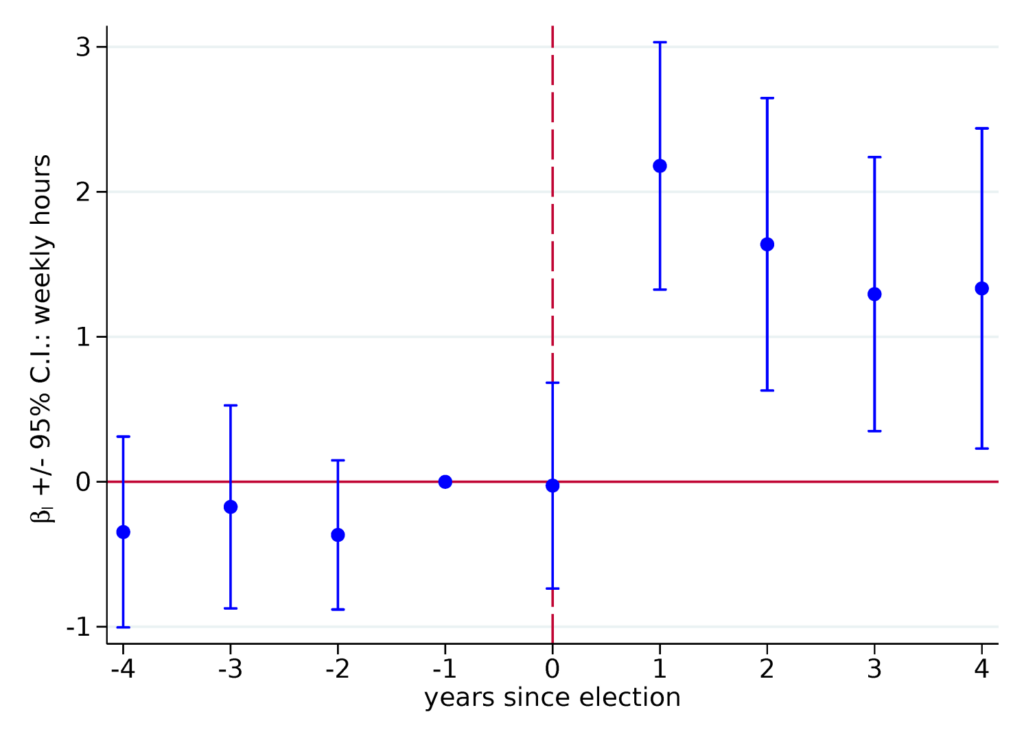
b) Hourly Wages
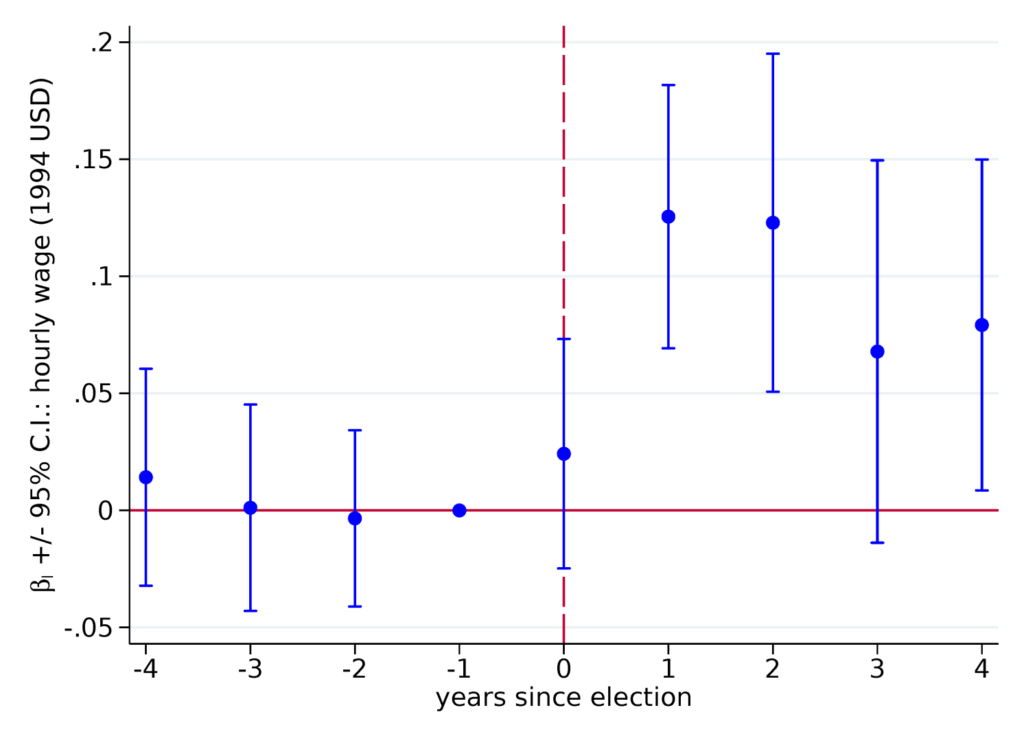
c) Earnings
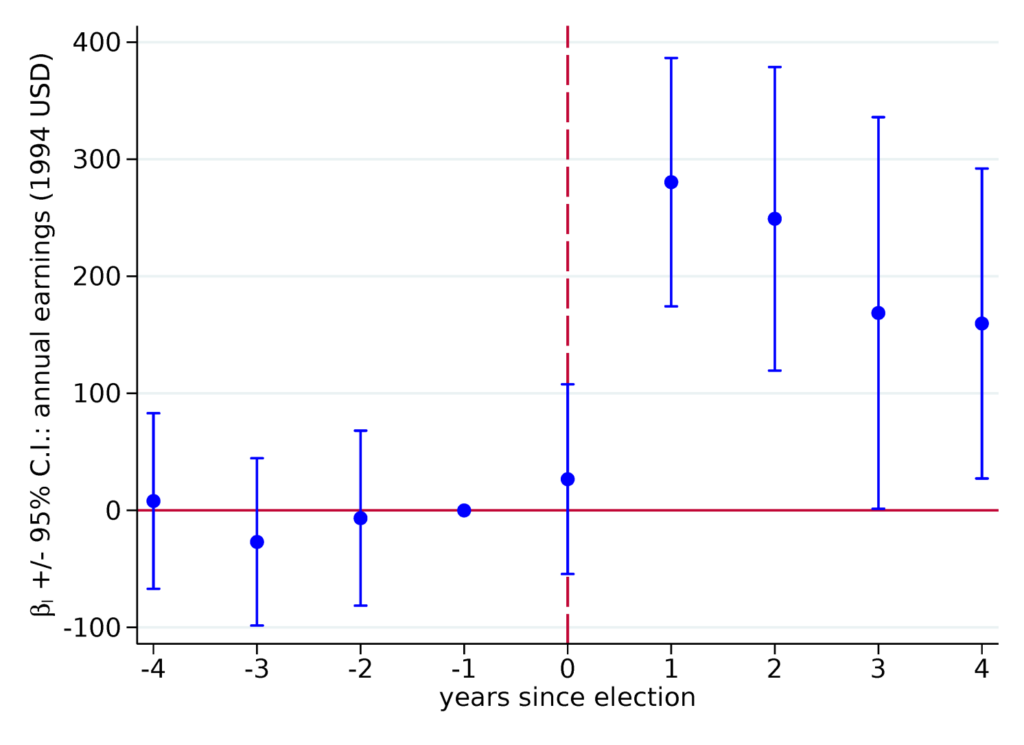
Much of these differential gains come from entering and remaining in the formal labor market where workers earn a wage premium (see Ulyssea, 2018 and VoxDevLit summary). Panel (a) of Figure 2 provides evidence along these lines, showing a sharp increase in the probability of working in the formal labor market for workers of winning versus losing campaigns. Most of these formal sector returns come from greater access to public sector jobs as shown in Panel (b) of Figure 2, which displays a large increase in the probability of working in the public sector for workers in winning versus losing campaigns in the 4 years after the election. Our estimates imply that workers on a winning campaign are 55% more likely to be public employees three years after the election compared to those who work for the runner up.
Figure 2: Campaign Connections, formal and public employment
a) Formal Employment
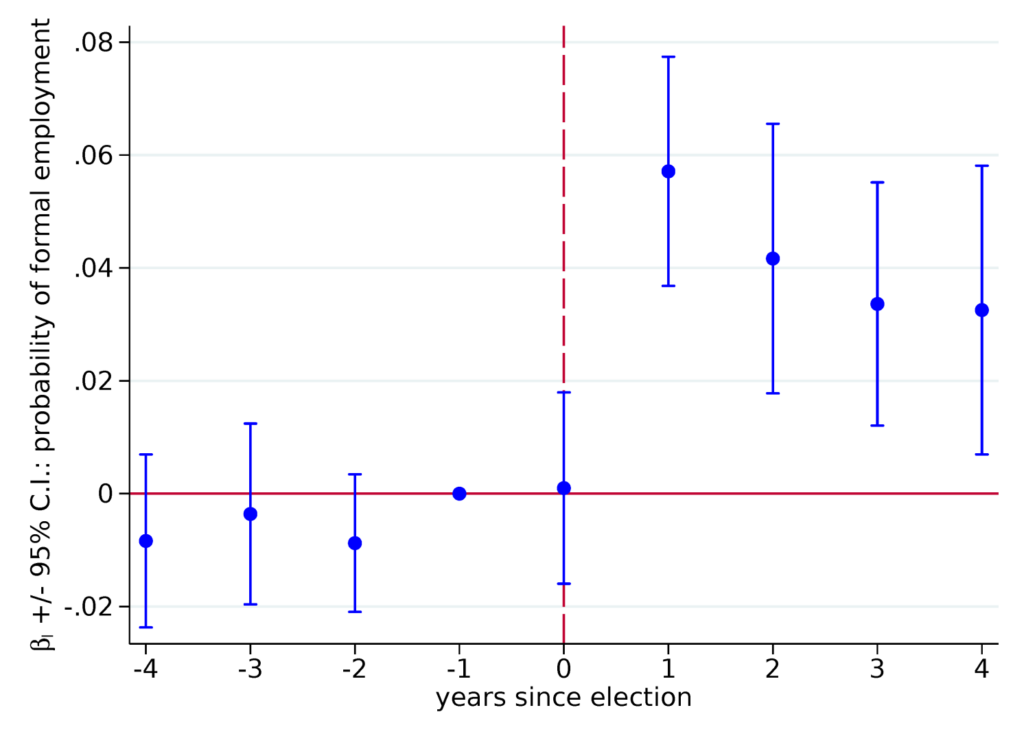
b) Public Employment
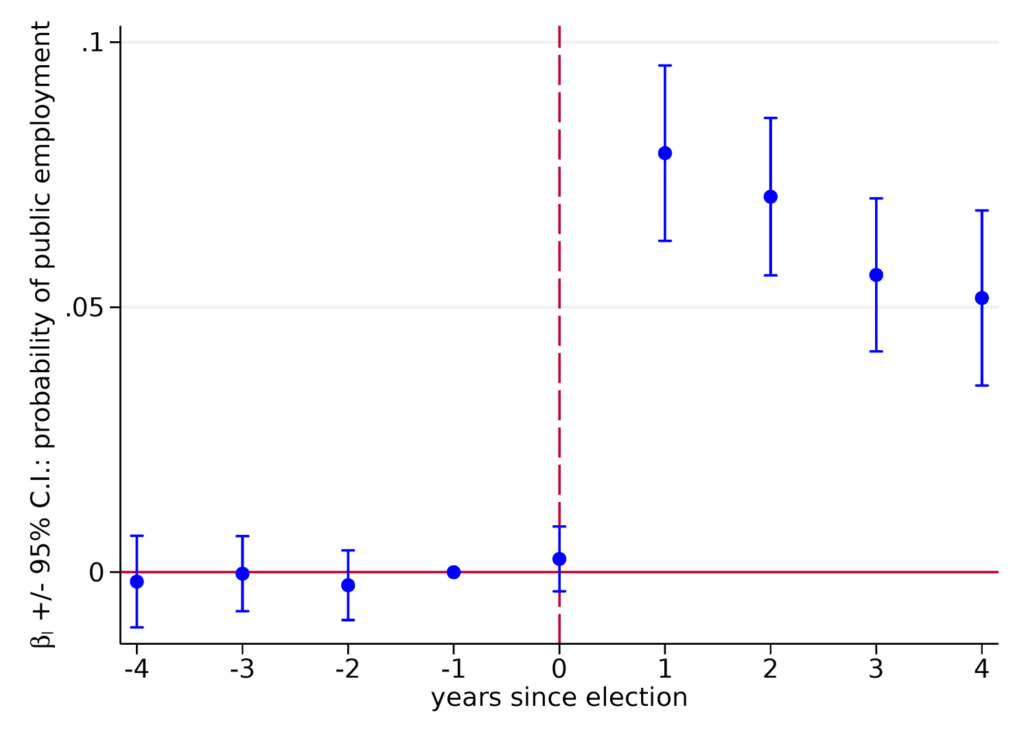
The returns from better access to public sector jobs are concentrated among workers connected to newly elected mayors. By contrast, re-elected incumbents tend to retain campaign-connected personnel hired in the previous election when they were challengers. Moreover, this differential access to public sector employment increases in proximity to the campaign: those providing more valuable labor services to the campaign are significantly more likely to enter the public sector than those providing less valuable services.
Finally, we find that campaign workers with higher ability are more likely to be hired into the public sector though campaign connections, especially in jobs for which they are appropriately qualified. This stands in contrast to evidence from Colonnelli et al. (2020) (see VoxEU column) who show, in the Brazilian context, that campaign finance donors with lower ability are more likely to gain access to public sector jobs through connections to victorious mayoral candidates. There are at least two explanations for this distinct result across the two types of campaign connections. First, campaign donors are, on average, eight years older than campaign workers who have comparatively less formal labor market experience in either the private or public sector. Second, victorious campaign staff are more likely to enter the public sector in areas where formal private sector opportunities are limited, as proxied by the share of informal employment in a municipality. In such places, the public sector may provide some of the few lucrative job opportunities for those with both ambition and the skills to match.
Overall, our findings indicate that electoral campaigns provide a way to build valuable connections with local politicians by supplying one’s labour. These connections are particularly beneficial to young, qualified workers as they provide a unique opportunity to enter the public sector for those with requisite qualifications but limited experience. In the specific setting of our study, campaign connections appear to be particularly valuable also because they provide a way to overcome some of the obstacles that young workers face in gaining access to formal jobs in developing countries. In fact, a growing literature highlights the value of building a marketable reputation as well as networking with potential referring employees at desirable firms. Our findings show that campaign connections offer these types of opportunities for qualified workers otherwise precluded from higher-paying jobs in the formal sector.
This article was originally published in VoxEU. It has been slightly amended for style.
Articles represent the opinions of their writers, not necessarily those of the University of Chicago, the Booth School of Business, or its faculty.






